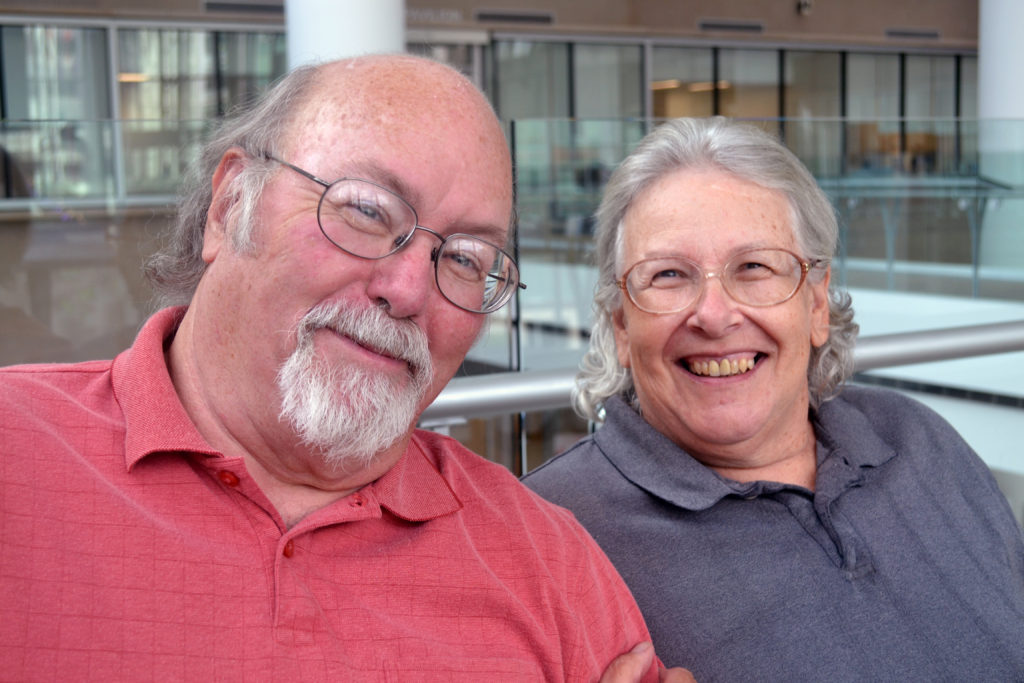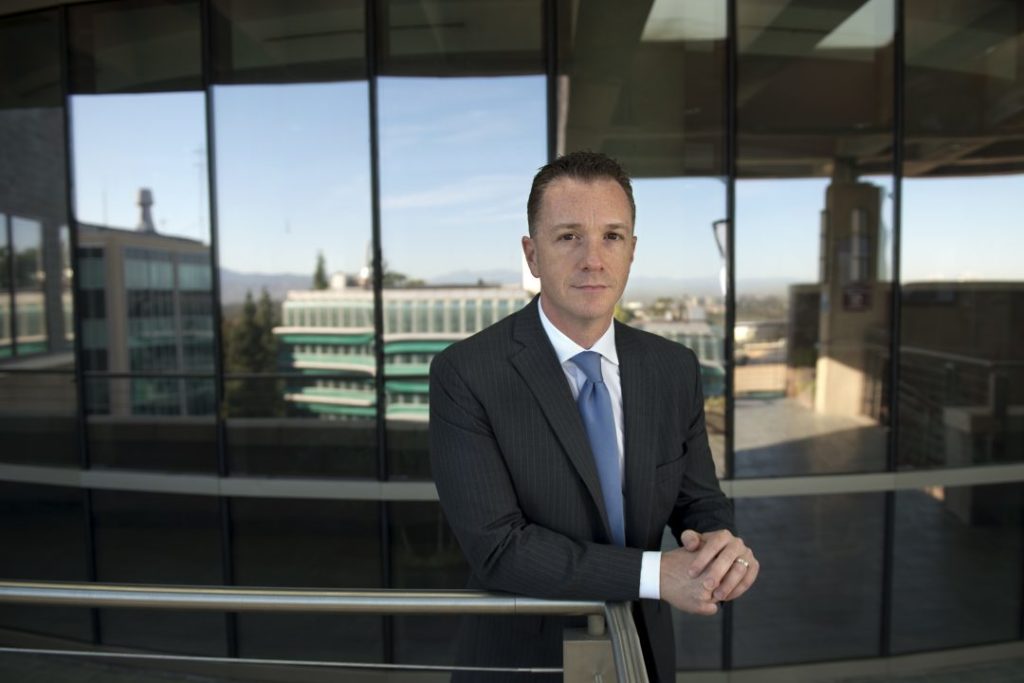“One day my wife and I will walk out of the darkness and into the light. I know we will.”

John Witzman (left) was always by his wife Jacqueline’s side as she participated in a clinical trial at the Penn Memory Center. Jacqueline has Alzheimer’s disease. (Photo by Terrence Casey)
John Witzman is a father, a grandfather, and a bubbly museum tour guide. He loves eating out for dinner and teaching his grandson how to put on socks. But first and foremost, he has been a devoted husband for 44 years. And since his wife was diagnosed with Alzheimer’s disease, even the simplest of pleasures have changed drastically.
“I didn’t expect that I would also have to help my wife with her socks,” he said. “Now we go out to dinner most nights of the week. Part of the reason is because it’s good to get out of the house and into a social setting, but also it’s because I don’t know how to cook much. For all of our years together, she always was the chef, but now eating at home is a bigger challenge.”
As his wife’s condition deteriorates, Witzman wants to do everything in his power to help her. He has learned to be more patient with her. He reminds himself that he is angry not at his wife, but at her condition. He practices focusing on the positives, accepting that failure will always be a part of changing their routines.
Hope, however, is not lost on Witzman. He and his wife are avid participants in research. For years, they have been enrolling in clinical trials. A tenacious spirit, Witzman goes to great lengths to support his wife and ease her condition.
“It’s not easy, because doctors always tell me to look out for certain benchmarks to see how she’s progressing, and sure enough they keep coming true. She’s not getting healthier,” he said.
“But I do believe that by being involved in research, we’re part of a community. I believe in the cause that in five years or in 50 years, what my wife and I are doing will help our kids and theirs to avoid this.”
Study Partners
For studies relating to Alzheimer’s disease and dementia, enrolling a single patient in the study typically requires two participants: the patient and the study partner. Broadly, a study partner is an individual who lends support and logistical assistance to the patient, while also providing researchers with information about the patient.
For the friends and family of those affected, there are many reasons to get involved in Alzheimer’s disease research, both as caregivers and study partners. But for each reason for participation, there is an obstacle or excuse discouraging potential partners from enrolling in clinical research trials.
In this video, Dr. Madhav Thambisetty of the National Institute on Aging at NIH discusses the role of study partners in Alzheimer’s disease clinical trials, and a study partner relates her experience in an Alzheimer’s trial.
The study partner’s task is no trivial matter. In clinical research trials, study partners must provide accurate assessments of the patient’s progress, ensure the patient’s adherence to a strict medication regimen, and oversee attendance at appointments with researchers. Because the patient may be experiencing cognitive decline and memory loss, a study partner’s role as informant remains essential to the collection of useful data. As the disease progresses, the study partner takes on an increasingly integral role.
The study partner serves not only as informant, but also as logistical aid. The study partner is often involved in transportation, describing risks and benefits to the patient, and helping researchers through the process of informed consent.
Researchers and patients alike rely on study partners to be proactive and reliable. The day-to-day work can be trying, but the long-term commitment makes clinical research on Alzheimer’s disease possible.
The scientific community spends millions of dollars trying to understand the brains and behavior of study participants, but what do we know about their partners? Who are these people? Researchers and clinicians rely on them. Participants depend on them. So what motivates a study partner to join a research project, and how can he or she affect a study?
“The single most common reason a trial fails is because it doesn’t adequately recruit a full sample size or the right sample size,” said Joshua Grill, PhD, an associate professor of psychiatry & human behavior at University of California, Irvine. “Study partners are the key to recruitment.”

Joshua Grill, co-director of UCI MIND and associate professor of psychiatry & human behavior. Steve Zylius / UCI
For many Americans, a study partner is a familiar face. Imagine a family member or a close friend who may already be a primary caretaker for the participant. According to the Alzheimer’s Association, while most caregivers for people with dementia are adult children, the majority of study partners in dementia research – about 66 percent – are spouses or domestic partners of the participants. This raises an intriguing numbers problem for Grill.
“Overwhelmingly, most Alzheimer’s patients don’t have a spouse,” he said. “There is a real disparity, then, in terms of who has this disease and who enrolls in our trials.”
In a study led by Johns Hopkins professor Betty S. Black, PhD, 62 study participants from nine clinical trials related to aging and dementia were interviewed to better understand the effects of study partners on research.
“Study partners let a person with dementia or cognitive impairment participate in research,” she said. “They become the guide for the person going through the disease progression. They become, in many ways, the hands and brain of the person participating in research.”
Without a study partner, the participant has no road map. As memory impairment gets worse, the need for a partner only increases.
Researchers identified the many reasons to engage in study trials: altruism, a desire to feel actively engaged, a search for hope, and a lack of other treatment options. The most common reason for involvement, though, is that partners long for their loved one to get better.
One spouse explained her desire to see her husband’s condition improve:
My expectation is that it would improve his memory. I don’t think there is a cure for Alzheimer’s, I really don’t, but I would love to see an improvement in some of the things that he’s exhibiting right now, memory and confusion and even his depression. If I could even just see a 50 percent, a 20 percent – I’d be thrilled with 20 percent. I’d love a 50 percent improvement, and just prolong that so that he has a better quality of life. That’s really it, just hoping for a better quality of life for him and for me.
That closing statement was a common refrain in Black’s research; study partners are working to make their own lives easier.
Study partners frequently reported their own desire to learn about the diagnosis or assessment, to better understand the participant’s status over time, or simply to have another, more specialized set of eyes on the patient’s wellbeing.

Jean Atlee
“The positive side of being a study partner is having access to superior medical staff, research physicians and clinical trial leaders,” said Jean Atlee, a study partner to her husband in multiple clinical research trials at the Penn Memory Center since 2008. “I have always felt that we were not just a ‘number,’ but that we were a valuable part of that community to perhaps help those in the future by the results of these various trials.”
While many partners strive for a brighter future with their loved ones, altruism remains at the core of this work.
The advancement of knowledge and scientific understanding are a major impetus behind today’s Alzheimer’s research. This reality falls heavily upon participants and their partners, whose all-consuming efforts are often met with negative results or inconclusive evidence. In a field with more questions than answers, frustration is terribly common.
Although disheartening results can breed cynicism, biomedical researchers must make clear the far-reaching goals of a study. Participants should understand that their involvement will benefit future generations. Considering the genetic components underlying Alzheimer’s and other forms of dementia, myopia is no friend to the families affected. Caregivers and patients should embrace hope — that even seemingly futile efforts might translate into healthcare breakthroughs for their children and grandchildren. At the very least, they will have done their part to improve the lives of their own children and grandchildren.
With no promise of reward in sight, study participants are determined to keep trying.
“The thing is in this particular case, with this particular disease, there’s virtually very few or no alternative,” one study participant said. “There’s no known cure. There’s nothing for Alzheimer’s. You’re gonna reach for whatever you can get.”
Her reason for participation? Hope.
Burdens for Study Partners
When Black inquired as to whether her study partners were experiencing any additional challenges due to their research participation, one-third denied any change.
Minor responsibilities like dealing with email and phone correspondence, scheduling appointments, and administering medication, can seem more daunting in their aggregate form. But those in this third down-played the onus.
Those who did report burdens cited logistical inconveniences. Travel, constant appointments, meeting delays, and last-minute scheduling changes can make for a hectic schedule. Traveling long distances or repeatedly making the same trip can exasperate many partners.
This is not even to mention the emotional toll with which most study partners are well-acquainted.
The study partner cannot be a purely unbiased or objective source. Almost inevitably, stress will come. For some, it dawned on them in the waiting room, faced with late-stage patients foreshadowing the decline of their loved ones. Sometimes, they were asked questions they could not answer. Or worse, they did know the answer, but saying it aloud felt like an admission of serious cognitive deterioration. And the study participants’ struggles often went hand-in-hand with those of their partners. Long waits, delays, or procedural mistakes took a toll on both the patient and the partner.
Black and her colleagues have shone a light on an undervalued, but exceedingly necessary, facet of Alzheimer’s disease and dementia research: accommodating study partners may enormously improve the efficacy of research projects. The goal is to increase participation in research and to create a more enjoyable experience for those involved. Reducing study partner burdens and reinforcing the positive reasons for research participation are two such steps toward this end.
Grill made a similar assessment. Tailoring messages about research trials to specific study partner groups, including spouses and adult children, may lead to more invested and reliable partners. The ultimate result may be a more effective trial.
Making life better for study partners
“I would like to see a study where the psychology of study partners is looked at. Being a partner can be lonely and isolating,” Witzman said. “Of course the patient who has the condition should be at the center, but being right next to it takes a toll. At the end of a long day, week, or year, you can feel drained and even depressed.”
Black said she has heard testimonies from study partners like Witzman, and she agrees that further work is necessary to accommodate partners.
“These are folks who want to know what is happening,” she said. “They want to be a part of the process. They deserve to be told by the researchers that they are important.”

For other researchers in this field, Black has a few recommended methods for improving the study partner experience.
First, consult past study partners in an official capacity to learn about their experience.
Second, incorporate feedback into the protocol of a trial. If partners say that they want to be more involved, then they should have a scheduled meeting with the Principal Investigator.
Participants also asked that researchers keep in touch about study results and new developments in the field.
According to Black, however, the most urgent area for change is in keeping hope alive.
“Make sure they have hope. Hope plays a big role in why people get involved, and even if the results aren’t as positive as we all want, in every research study we are learning.”

